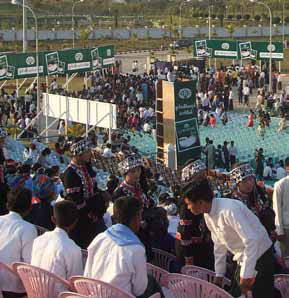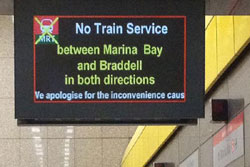
OSK-DMG: BUY Super for exposure to Myanmar
Analysts: Tan Han Meng and Terence Wong
OSK-DMG maintained its ‘Buy’ call on Super Group after identifying it as one of a few candidates that could offer investors exposure to Myanmar’s growth.
Myanmar is the 4th most populated country in ASEAN with ~54m people and its GDP is projected to double to US$124b by 2020 according to IHS Global Insight, or an average 6% growth per annum.
On 30 Nov 11, Ms. Hillary Clinton arrived at the airport in Naypyitaw – capital of Myanmar, making her the first US secretary of state to visit the country in more than 50 years.
Her visit attracted media frenzy as well as global investment community’s attention, which sparked the speculation that Myanmar being one of the few remaining frontier markets could be the next Tiger of Asia.
Hopes are high now in the land of more than 50m people following Ms. Aung San Suu Kyi’s landslide win in a historic by-election on 1 Apr 2012, putting pressure on the West to lift sanctions on the country.
An opportunity could come on 23 Apr 2012 when the European Union's Council of Ministers meets in Brussels, with one of the agenda is to decide on what to do with sanctions on Myanmar.
The lifting of sanctions could boost regional growth and intra-ASEAN trade and investment. In addition, the domestic consumer market is expected to grow rapidly, creating a fast-growing market for exports of goods and services.
Being one of the most recognizable household brands in Myanmar, Super Group is estimated to account for over 30% of market share for instant coffee sales and derived about 16% of its revenue from the country in FY2011.
”We expect Super's FY2012-FY2013 earnings to grow by 32%-12% to S$67m-S$75m respectively, and ROE to reach 17% by FY2012 (FY2011: 14%). Maintain BUY at TP of S$2.08, pegged to 15x FY13F PER.”
Related story: SUPER, STAMFORD TYRES, SINO GRANDNESS: What Analysts Now Say...

Kim Eng: Singapore Budget to benefit Comfort Delgro
Analysts: Bernard Chin and Gregory Yap
As the market leader in bus operations, ComfortDelgro is the clear winner with government initiatives to quickly fix massive MRT disruptions by promoting bus ridership.
After all, putting more buses on the road is a quicker fix compared to adding new rail lines.
Singapore currently has two private transport operators – SMRT and ComfortDelgro. They run a mixed modal public transportation system of rail, bus and taxi, with each taking care of its own geographical markets and niches.
SMRT operates the North-South and East-West rail lines and the Circle Line, together with a fleet of 800 buses and 3,000 taxis.
ComfortDelgro, through its 75%-owned subsidiary SBS Transit, operates the North-East Line and the future DownTown Line, supported by a fleet of 3,000 buses and 15,600 taxis.
Under Budget 2012, the Singapore government will set aside S$1.1 billion under the Bus Services Enhancement Programme (BSEP) to fund a significant expansion of bus capacity in response to rail woes.
This is the latest intervention to improve our public transport system following the massive disruptions that have plagued the MRT since last December.
”An expanded fleet will mean stiff competition for bus captains, and we think that SMRT may get the short end of the stick. Wage negotiations with labor unions also must be adroitly handled.”
”Buy ComfortDelgro, avoid SMRT. We reiterate our preference for ComfortDelgro over SMRT, and believe that it justifies a higher 16x PER valuation based on recent initiatives to improve bus ridership. Its geographically diverse business also offers greater earnings resiliency and more upside potential versus SMRT’s all-domestic model.”

JP Morgan: SIA has best risk-reward ratio among airlines
Analyst: Corrine Png
After IATA reported that international pax traffic rose 7% year-on-year in Jan-Feb, JP Morgan said that it sees the best risk-reward for airlines in SIA (0.9x P/B, net cash is about 27% of market cap), but investors with higher risk appetite could look at Air China, KAL and CAL in the medium term.
The operating performance for the global airlines was favorably impacted by the earlier CNY holidays and Brazil Carnival this year.
“The outlook for markets remains fragile with improvements in business confidence slowing in February, containing the upside for business travel, and higher fuel costs are threatening price sensitive markets. Cargo load factors have stabilized, albeit at low levels, limiting further deterioration in freight markets,” according to IATA.
International cargo traffic fell 2% in Jan-Feb. This is because Asia Pacific has a 42% market share for global airline cargo and the higher shipments in Feb were offset by much lower shipments in Jan due to CNY holidays.
Jan-Feb cargo capacity also rose 3%, which led to lower cargo load factor of 48%.
IATA represents about 230 airlines carrying 93% of the global scheduled international traffic.







Comments
Just my two cents worth.